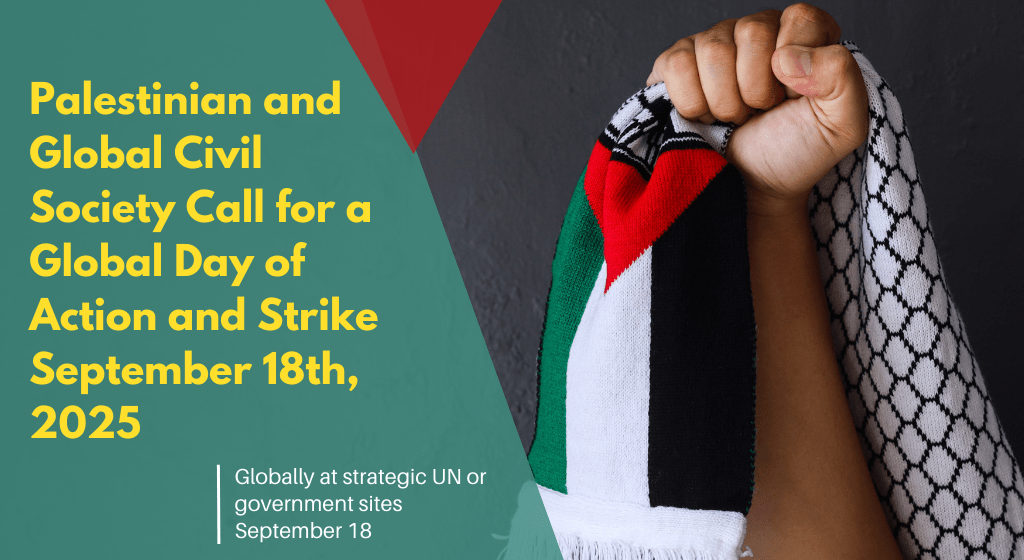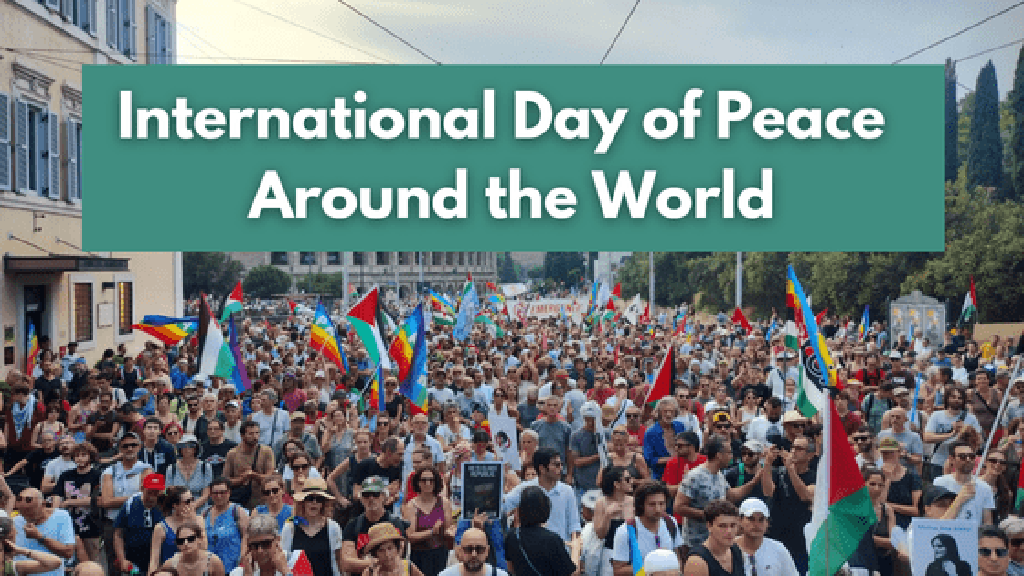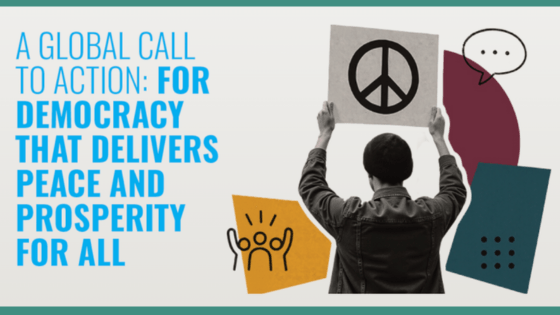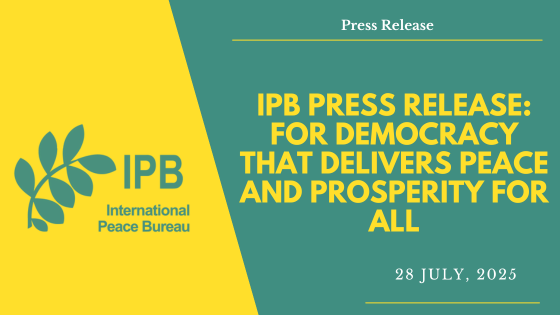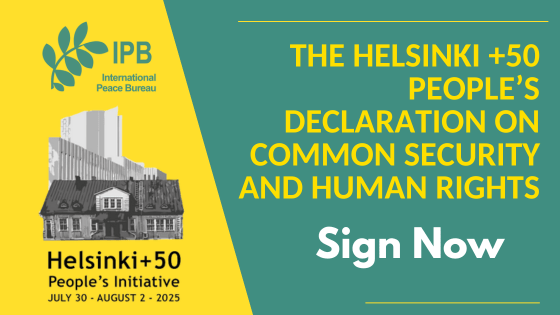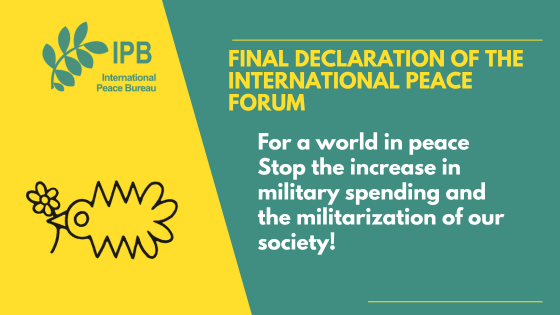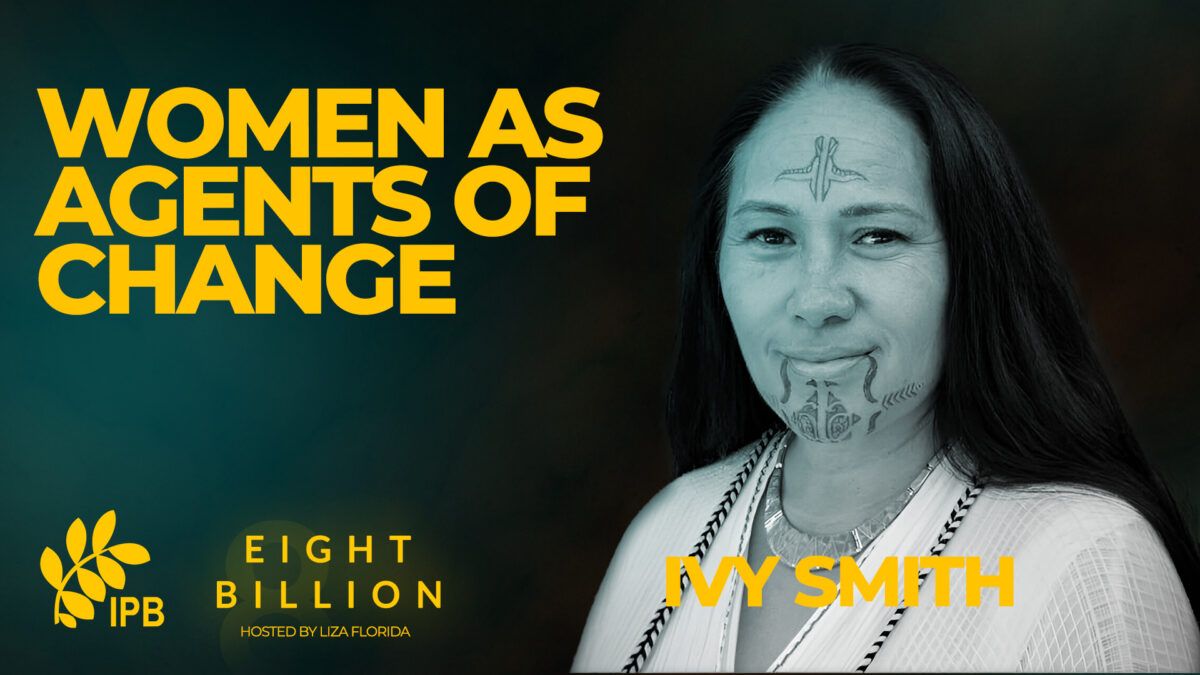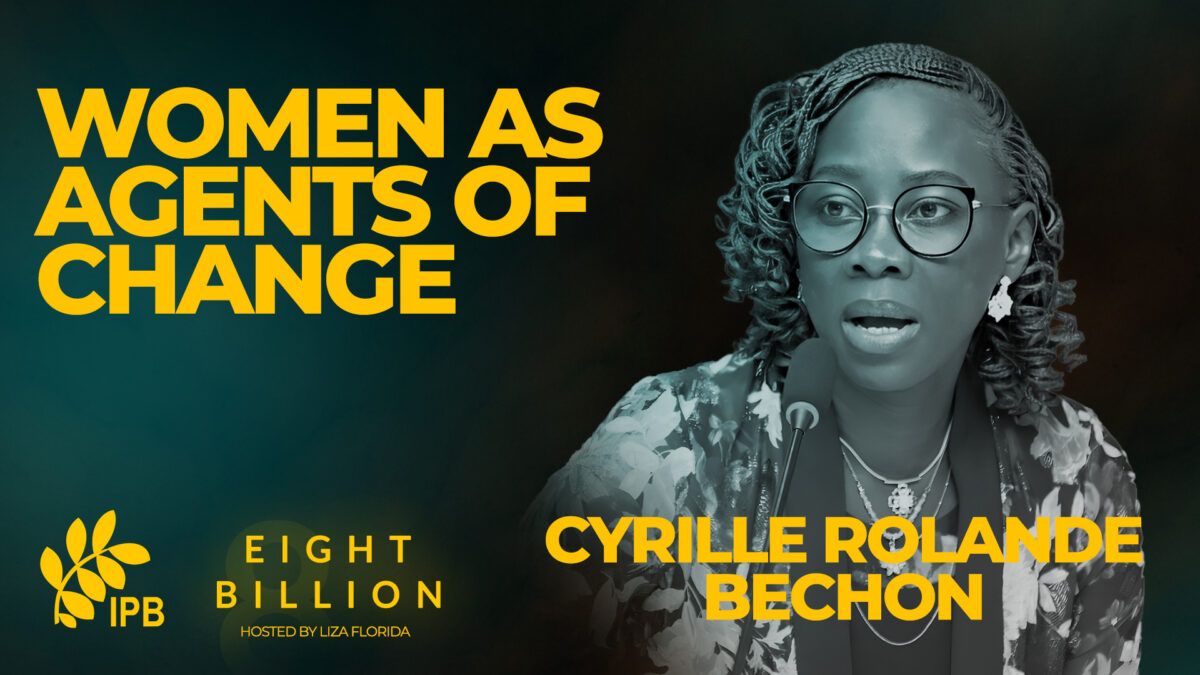On September 18, 2024, the United Nations General Assembly (UNGA) adopted Resolution A/ES-10/L.31, demanding Israel end its unlawful presence in the Occupied Palestinian Territory (OPT) within 12 months and to immediately comply with the provisional measures in the genocide case at the International Court of Justice (ICJ). Since then Israel has entrenched its occupation and escalated its genocidal attacks on Gaza causing the United Nations to declare famine in Gaza. The Palestinian NGO Network (PNGO) and Global Civil Society is calling for a Global Strike and Day of Action on September 18, 2025, to denounce Israel’s refusal to comply with this order, and to demand that UN member nations act immediately to end Israel’s genocide against the Palestinian people.
Continue reading “Palestinian and Global Civil Society Call for a Global Day of Action and Strike September 18th, 2025”What we do
International Peace Day 2025
The International Day of Peace, observed every year on September 21, calls on us to strengthen the ideals of peace within and among nations and peoples. In a world marked by conflict, inequality, and discrimination, it is a reminder of our urgent responsibility to foster solidarity, advance disarmament, nurture empathy, and build sustainable peace for all.
On this day, let us remember: peace must always be created together and for everyone.
No post found
Unyielding Grace: Shirine Jurdi and the Feminine Force for Justice
This episode brings you a powerful and unflinching conversation with Shirine Jurdi, a global advocate for women, peace, and security from Lebanon. Prepare to challenge your perspectives as Shirine dismantles the narratives often imposed on women in conflict zones, offering a raw and honest look at the realities of war, justice, and the fight for a life of dignity, not just survival.
Continue reading “Unyielding Grace: Shirine Jurdi and the Feminine Force for Justice”A GLOBAL CALL TO ACTION: FOR DEMOCRACY THAT DELIVERS PEACE AND PROSPERITY FOR ALL
FOR DEMOCRACY THAT DELIVERS PEACE AND PROSPERITY FOR ALL
As we approach the 80th anniversary of the atomic bombings of Hiroshima and Nagasaki, we, the undersigned organisations, call on governments and international institutions to reaffirm their commitment to a world free from nuclear weapons, honouring the demand of the Hibakusha and 2024 Nobel Peace laureate Nihon Hidankyo, and to prioritize sustainable development over militarism, people of collective power, accelerating military build-up and climate change, and diverting resources away from human development and peacebuilding.
As organisations from the peace, labour, economic justice, and climate movements, we share the belief that collective security can only be ensured through solidarity, by meeting the basic needs of all people.
Continue reading “A GLOBAL CALL TO ACTION: FOR DEMOCRACY THAT DELIVERS PEACE AND PROSPERITY FOR ALL”IPB Press Release: For Democracy that Delivers Peace and Prosperity for All
27 July 2025, Berlin, Germany
The International Peace Bureau (IPB), in cooperation with the International Trade Union Confederation (ITUC), Greenpeace, the International Campaign to Abolish Nuclear Weapons, Oxfam, and 350.org, has released a global call to action for nuclear and conventional disarmament, common security, and a prioritization of sustainable development over militarism.
Continue reading “IPB Press Release: For Democracy that Delivers Peace and Prosperity for All”10% for All: A global campaign to cut military spending, reframe security, and invest in humanity
The Global Military Spending Crisis
In 2024, the world spent an unprecedented 2.718 trillion USD on military budgets—equivalent to the entire budgets of South Africa, Canada, Brazil, and India combined. This massive expenditure represents the highest military spending ever recorded, a 9.4% increase from 2023, surpassing even Cold War levels. Meanwhile, multiple, simultaneous global crises persist: hunger continues to claim millions of lives, the climate crisis intensifies, and human security remains fragile. The world also grapples with escalating refugee crises, the rise of authoritarianism, and deepening global inequalities, all of which threaten the stability and well-being of societies worldwide.
Continue reading “10% for All: A global campaign to cut military spending, reframe security, and invest in humanity”The Helsinki +50 People’s declaration on common security and human rights
Drafted by Nordic Peace Alliance’s working group on Helsinki+50
Preamble
Inspired by the Helsinki Final Act signed on the 1 st of August 1975, we, civil society organizations and individuals from Europe and beyond, call for the reinvention and revitalization of cooperation for common security and human rights in Europe. The conference in Helsinki paved the way for several positive achievements, serving as the closest thing to a peace agreement for post-World War II Europe during the continued Cold War period. The allied victory in WWII led to the formation of the UN and the adoption of indivisible human rights and the UN Charter which is the basis of international law. The Helsinki Final Act built on these achievements and promoted economic, social, cultural, environmental, scientific, and humanitarian cooperation. Thus, the Helsinki Final Act created the necessary environment for détente, arms reduction, and a dynamic peace and human rights movement of global importance.
Final Declaration of the International Forum for Peace
For a world in peace
Stop the increase in military spending and the militarization of our society!
The world is at a crossroads. On the one hand, the world capitalist system, imperialism that insists on maintaining a unipolar order, anchored in centuries of colonial domination, with NATO acting as the military, political and ideological arm of that old and unjust international order. On the other side, there are the forces that seek to make way for a new multilateral order, committed to the principles of the UN, which is committed to peaceful coexistence, mutually beneficial cooperation, social progress and solidarity.
Continue reading “Final Declaration of the International Forum for Peace”The Heartbeat of Humanity: A Global Treaty for Mother Earth with Auntie Ivy Smith
Dive into a sacred conversation with Auntie Ivy Smith, a wisdom keeper and indigenous advocate from Aotearoa. This episode is a bridge between ancient truths and future possibilities—a global message of healing, responsibility, and profound change.
Episode Overview
In this deeply moving episode of the Women as Agents of Change podcast, Liza Florida sits down with her dear friend, Auntie Ivy Smith, a powerful voice for indigenous peoples worldwide. Auntie Ivy shares the sacred story behind her facial tattoo (tā moko), a global message for humanity. She recounts her decade-long, self-funded journey to over 30 countries to connect with frontline communities, find truth, and build alliances.
This conversation goes beyond talk and into the heart of action. Auntie Ivy introduces her vision for a global treaty—one not owned by governments, but held in reverence for Mother Earth and stewarded by the next generation. She speaks on the power of ancestral technology, the urgent need for collective healing, and the critical solutions indigenous communities have always held. This is not just a podcast episode; it is a call to remember who we are, heal the past, and unite to protect our planet for a better tomorrow.
Key Topics Covered
The Sacred Story: Auntie Ivy explains the profound meaning of her facial tattoo—a message of responsibility, accountability, and the interconnectedness of all life.
A Global Walk for Truth: Her experience traveling self-funded to over 30 countries to listen, learn, and build a network of over 200 frontline ambassadors for change.
A Vision for a Global Treaty: The powerful concept of a treaty where ownership belongs to Mother Earth, designed to move beyond colonial frameworks and be led by the youth.
The Old Ways are the New Way: Contrasting the destructive behaviors of greed and control with the true wealth of indigenous cultures: sharing, mutual care, and living in balance with nature.
The Rise of Youth Leadership: Why the younger generation is crucial for the future and how we must support, guide, and protect them as they lead the charge.
Ancestral Technology & Real Solutions: A call to invest in proven indigenous solutions for clean water, clean energy, and healing medicine, rather than wasting resources on less effective modern technologies.
The Urgency of Healing: Why collective healing from past traumas is essential to move forward and how supporting indigenous healers is key to healing humanity.
A Call to Action for Humanity: A direct appeal for allies, resources, and good-hearted investors to help record sacred wisdom, establish healing centers, and buy back land to implement lasting solutions.
Powerful Quotes from Auntie Ivy Smith
- “This sacred story is a global message for humanity, and it comes with a responsibility, a dedication and accountability to how you conduct yourself.”
- “We’ve always had the solutions. Our wealth is looking after each other, our wealth of sharing.”
- “The ownership belongs to Mother Earth, this planet and everything that gives us life. We humanity… just need to educate and bring awareness.”
- “If we don’t heal the past, we are gonna continue to take this energy forward.”
- “We are in 2025. We have the solutions and we want to share, train, upskill people that want to be a part of this movement. And we are ready now to start today, to save tomorrow.”
- “Please come and sit with us so we can share our truth and wisdom, our knowledge.”
Watch Now on Youtube:
Listen on your favorite podcast platform:
Innovative Projects & Global Initiatives
A Global Treaty for Mother Earth: A visionary framework for planetary stewardship that removes government and corporate ownership, placing reverence for the Earth at its center. The goal is to gather allies and hold a summit to formalize and launch this movement.
Sacred Wisdom Film Archive: An urgent project to fund a film crew to travel to remote locations and record the knowledge of the last sacred wisdom holders before it is lost forever.
Global Indigenous Healing Centers: A call to establish and support healing centers led by true indigenous healers to address trauma, addiction, and homelessness, and to train others in ancient healing practices.
Ancestral Technology Fund: A plea for investment in implementing proven, ancient indigenous technologies for free energy, water purification, and sustainable agriculture to create fast, effective change.
Connect with Auntie Ivy Smith
Auntie Ivy is building a global movement and is calling in allies, investors, and good-hearted people. To learn more about the treaty, her projects, or how you can contribute, please reach out via the contact information in the episode’s description box or connect with Liza Florida, who can facilitate an introduction.
Connect with Liza Florida
Instagram: @lizaflorida and @eightbillionproject
Facebook: https://www.facebook.com/eightbillionpodcast/
LinkedIn: https://www.linkedin.com/in/liza-florida-07597119
Website: https://lizaflorida.com/
Special Thanks
To Auntie Ivy Smith for sharing her sacred story, her profound wisdom, and her powerful vision for a healed world. Thank you for your heart and your tireless work.
To the indigenous wisdom keepers and frontline defenders around the world who protect the sacred for all of humanity.
To our listeners, may you hear this call to action, find your role in the change, and remember that we are all in this together.
About the Series
Women as Agents of Change is a special podcast series hosted by Liza Florida, presented in collaboration with the International Peace Bureau and Eight Billion Project. Each episode celebrates the wisdom, vision, and courage of women working to build a more peaceful and just world.
Unbreakable Spirit: Cameroun’s Fight for Justice with Cyrille Rolande Bechon
Journey into the heart of activism in Cameroun with Cyrille Rolande Bechon, a fearless human rights defender who stands resilient against systemic injustice and direct threats to her life’s work.
Episode Overview
In this powerful episode of the Women as Agents of Change podcast, Liza Florida connects with the indomitable Cyrille Rolande Bechon, Executive Director of Nouveaux Droits de l’Homme (New Human Rights) Cameroun. Cyrille shares her incredible journey from growing up in a large polygamous family, where she first learned to fight for her voice, to becoming a leading activist for democracy and human rights in her nation. She provides a raw, firsthand account of the pressing human rights violations in Cameroun, fueled by an authoritarian regime and widespread conflict.
This is a story of profound courage. Cyrille details the devastating physical and cyberattacks on her organization this year, which resulted in the loss of 15 years of work. Yet, through it all, her spirit remains unbroken. This conversation is a testament to the power of community, the crucial role of data-driven advocacy, and the unwavering passion that fuels activism even in the darkest of times.
Key Topics Covered
A Childhood of Defiance: Cyrille’s upbringing in a traditional, polygamous family and the pivotal moment she addressed her own father in a family meeting to assert her rights as a young girl.
Freedom of Speech as Survival: How personal life choices that defied societal norms forced her to develop a fierce commitment to her own voice and autonomy.
The State of Human Rights in Cameroun: An inside look at the country’s most urgent issues, including a decades-long authoritarian regime, the shrinking of civic space, torture in detention, the Anglophone crisis, and rampant violence against women.
Advocacy in Action: Cyrille’s strategy of using individual legal aid cases—like the exoneration of a man after 15 years of wrongful imprisonment—to expose systemic flaws and fuel data-driven advocacy for national reform.
Under Attack: A harrowing account of the recent break-in, vandalism, and theft that destroyed her organization’s office and 15 years of work, followed by a crippling cyberattack.
Unbreakable Resilience: How Cyrille and her team found the strength to return to their mission, motivated by an outpouring of local and international solidarity.
The Power of Solidarity: What solidarity looks and feels like on the ground, from messages from the community saying “Never give up” to support from international organizations.
A Vision for a New Cameroun: Cyrille’s dream for her country—a place where basic needs are met, justice prevails, and women and girls hold power in every sector of life.
Powerful Quotes from Cyrille Bechon
- “Freedom of speech… become a matter of survival. You have to fight to have a place, you have to fight to be heard, you have to fight to make people accept my choices.”
- “We are not employees, we are activists. We do this because we have a vision.”
- “They took everything, but they didn’t take our passion. They didn’t take our heart on what we are doing.”
- “While looking for relief for victim, we use those data to fuel the advocacy work.”
- “Never give up. We need you.” (Message from the community after the attacks)
- “My heart, my hands are open… It is our fight. It’s not others. It is the fight for our life.”
Watch Now on Youtube:
Listen on your favorite podcast platform:
Innovative Projects & Global Initiatives
- Nouveaux Droits de l’Homme (NDH) Cameroun: Cyrille’s organization, which promotes and protects the rule of law and democratic principles. It provides legal aid to victims of violence and advocates for systemic reform.
- Case-Based Advocacy: NDH’s core strategy of meticulously documenting individual human rights cases to create an undeniable evidence base, which is then used to pressure the justice system and advocate for legal and policy changes.
- Community and Youth Engagement: Proactive work in universities, schools, and local communities to educate citizens on their rights and build grassroots support for democracy and justice, engaging with traditional and religious leaders to foster dialogue.
Connect with Cyrille Rolande Bechon
LinkedIn: https://www.linkedin.com/in/cyrille-rolande-bechon-a4425446/?originalSubdomain=cm
Nouveaux Droits de l’Homme Cameroun: https://ndhcameroun.org/
Facebook: https://www.facebook.com/CRBechon/
Connect with Liza Florida
Instagram: @lizaflorida and @eightbillionproject
Facebook: https://www.facebook.com/eightbillionpodcast/
LinkedIn: https://www.linkedin.com/in/liza-florida-07597119
Website: https://lizaflorida.com/
Special Thanks
To Cyrille Rolande Bechon for her incredible bravery, resilience, and unwavering dedication to building a more just and democratic Cameroun.
To the International Peace Bureau for their partnership and support for this podcast series. You can learn more about their work at https://ipb.org/ and see more on their YouTube channel: https://www.youtube.com/@ipb1910/videos.
To human rights defenders everywhere who continue to fight for a more just world, often at great personal risk.
To our listeners, may this story inspire you to use your voice and remember the profound impact of solidarity.
About the Series
Women as Agents of Change is a special podcast series hosted by Liza Florida, presented in collaboration with the International Peace Bureau and Eight Billion Project. Each episode celebrates the wisdom, vision, and courage of women working to build a more peaceful and just world.
Tags: Women as Agents of Change, Eight Billion podcast, Cyrille Bechon, human rights, Cameroun, rule of law, democracy, gender justice, activism, shrinking civic space, authoritarianism, solidarity, resilience, advocacy, community engagement, peace, human rights defenders.

